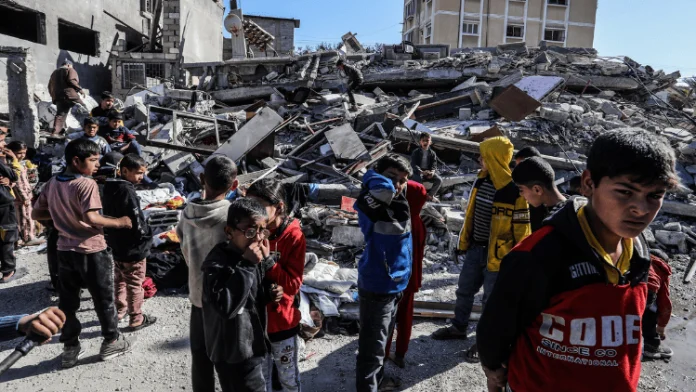UN Calls for Urgent Action to Address Humanitarian Crisis in Gaza
On Monday, the United Nations urged the global community to take immediate action to prevent further disaster in Gaza, emphasizing that “the essence of our common humanity is at stake.” During a session of the UN Security Council, Sigrid Kaag, the senior humanitarian and reconstruction coordinator for Gaza, provided a grave assessment of the situation, reinforcing the significant responsibility the international community has in addressing the tragedies stemming from the ongoing conflict.
Kaag highlighted the catastrophic impact on Gaza’s already fragile infrastructure, noting that the healthcare system has been “further decimated.” Alarmingly, she reported that over 625,000 children are currently out of school, with many facing futures clouded by “trauma, loss, and deprivation.”
In light of the ongoing crisis, Kaag reiterated the urgent need for a ceasefire, the unconditional release of hostages, and unrestricted humanitarian access. She stressed that “time is slipping away,” as conditions in Gaza deteriorate further, pointing out that inadequate protection for civilians is “unconscionable.”
She called for ensuring “unimpeded and safe access” for aid workers, citing the importance of political will in facilitating humanitarian efforts, as demonstrated by recent health campaigns. Kaag emphasized the essential role of the UN Relief and Works Agency for Palestine Refugees (UNRWA) in providing support to those in need, describing it as a critical partner in Gaza’s social infrastructure.
Kaag cautioned that without stronger political commitment, current humanitarian efforts would remain insufficient, stating, “Systems in place today are not a substitute for the political will required to reach civilians and respond to their needs.”
As winter approaches, she urged member states to assist over 14,000 patients requiring medical treatment outside Gaza and noted the necessity for a comprehensive solution to the crisis. “Humanitarian assistance is only a temporary pathway to alleviate suffering.
A just and lasting peace in the Middle East can only be realized through a two-state solution,” she articulated.
Echoing his sentiments, Jorge Moreira da Silva, head of the UN Office for Project Services (UNOPS), underscored the deteriorating situation in Gaza and the challenges in delivering humanitarian aid.
He reported that a significant amount of humanitarian assistance has been hindered by Israeli authorities, yet reasserted the commitment of UN agencies to remain in Gaza and support the urgent recovery and reconstruction efforts required.
Despite a UN Security Council resolution calling for an immediate ceasefire, Israel has persisted in its offensive in Gaza since a Hamas attack last October.
According to local health authorities, the conflict has resulted in over 41,000 deaths, primarily among women and children, with more than 95,000 injuries reported.
The ongoing blockade has precipitated severe shortages of food, clean water, and medical supplies, prompting accusations of genocide against Israel at the International Court of Justice. The situation in Gaza represents a critical human rights crisis that demands immediate international attention and action.














